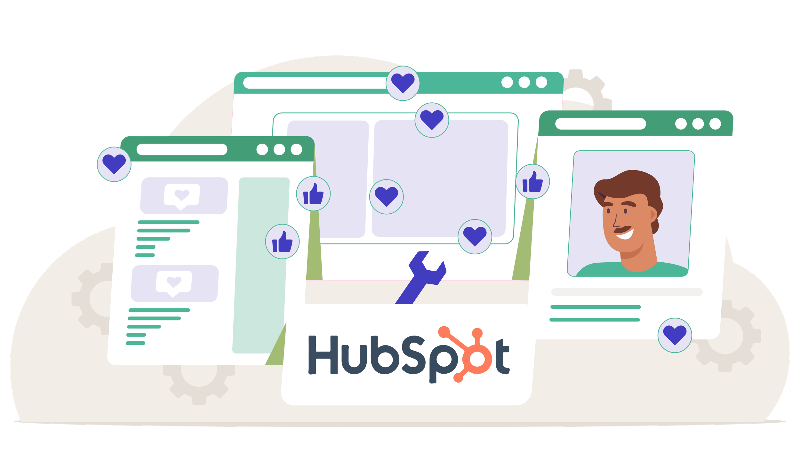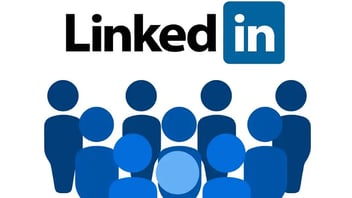Descubra cómo HubSpot Marketing Hub puede revolucionar el marketing en redes sociales. Automatice y aproveche la IA para maximizar la participación.
Guía para principiantes sobre marketing en Facebook
Así que eres el propietario de un nuevo negocio que necesita empezar a generar clientes potenciales cuanto antes. Seguro que has oído hablar de las infinitas posibilidades que ofrece Facebook para promocionar tu negocio, pero ¿cómo sacar el máximo partido a esta plataforma? Te damos algunos consejos para que empieces a aprovechar el poder de Facebook para tu negocio.
Entender los "FaceBasics"
También existen los Grupos de Facebook, los Eventos y otros matices, pero los dejaremos para otro post).
Páginas personales frente a páginas de empresa
Los perfiles personales no están diseñados para promocionar empresas y, por lo tanto, no te ofrecen la posibilidad de hacer publicidad (impulsar publicaciones) ni de obtener "información", como visualizaciones de publicaciones y otras estadísticas de participación. También separan las publicaciones de la comunidad de seguidores del feed principal de tu negocio, lo que puede ser positivo. El Administrador de empresas de Facebook tiene mucho que ofrecerte para promocionar tu negocio, y necesitarás tanto un perfil como una página de empresa para acceder a él.
Si tu nombre y tu marca son sinónimos o quieres que lo sean, te conviene crear una página de empresa para ti. Puedes utilizar tu página para invitar a amigos interesados si ya tienes seguidores. Siempre puedes compartir las publicaciones de tu empresa en la página de tu perfil.
Buenas prácticas en redes sociales - Facebook
Qué publicar y con qué frecuencia es motivo de debate.
La opinión más extendida sugiere no publicar más de cinco veces a la semana y no menos de dos -ni más de una vez al día- para obtener mejores resultados. Publicar más de una vez al día puede diluir tu alcance, ya que Facebook tiende a limitar las publicaciones de empresas en los feeds personales. Por lo tanto, planifica tus mensajes en consecuencia para maximizar tu potencial de visitas. Las publicaciones más largas pueden ser atractivas, pero las más cortas y visualmente interesantes suelen tener un mayor índice de participación.
El componente más importante de tus esfuerzos de contenido en Facebook es compartir historias e información relevantes con tu comunidad. Cuanto mayor sea el índice de participación en una publicación determinada, más probabilidades habrá de que los seguidores vean publicaciones futuras. Debes centrarte en contenidos que fomenten la interacción y estén relacionados con los intereses de tus seguidores.
Por supuesto, hay excepciones a todas las reglas, así que si alguna de las anteriores no te parece adecuada, puedes probar métodos y hacer un seguimiento de tu rendimiento con la información de la página para desarrollar la estrategia que funcione para tu negocio. Suele ser una buena idea probar diferentes estilos y longitudes de publicaciones para ver qué funciona mejor con tu audiencia.
Asegúrate de que tus imágenes tienen el tamaño adecuado y se muestran de forma profesional.
¿Hueles mal? ¿Cómo es tu gramática?
Si no eres bueno en ortografía y gramática y no quieres contratar a una empresa de contenidos profesional (ejem), deberías encontrar otra forma de garantizar la precisión de tus publicaciones. Las faltas de ortografía [sic] pueden ser embarazosas y minar la credibilidad.
Para evitar a la policía gramatical -todas las páginas la tienen-, puedes redactar tus posts en Word, Google Docs o Pages y copiarlos en tus posts. También hay algunas extensiones de navegador, como Grammarly, que te revisarán en tiempo real online. Las versiones de pago son razonables, y la versión gratuita es útil.
También te puede gustar
Crea una comunidad para tu marca
A medida que desarrolles tu estrategia de contenidos en Facebook, es posible que desees recurrir a la ayuda de algunas herramientas en línea más allá de Facebook Insights y Business Manager.
Hazte notar en Facebook
Herramientas como HootSuite pueden ayudarte a programar publicaciones (otra función sólo disponible en una cuenta de empresa) con días o meses de antelación. Además, pueden ofrecerte un panel de control para gestionar varias plataformas o entidades empresariales. También puedes echar un vistazo a algunas prácticas extensiones de Chrome que ofrecen más formas de seguir y gestionar tu éxito en las redes sociales.
Consejos para gestionar los comentarios negativos
Con suerte, no tendrás que gestionar muchos comentarios negativos al principio de tu aventura en las redes sociales. Pero si lo haces, la mejor recomendación es manejarlos de forma directa y amable. Recibir comentarios puede ayudarte a identificar problemas y mejorar tu negocio, como ya sabes. También ofrece al cliente un lugar donde expresar su descontento y sentirse escuchado, lo que puede evitar que se manifieste por todo Internet.
Sin embargo, si el cliente no puede ser apaciguado racionalmente, también puedes "ocultar" una publicación. Al ocultar un mensaje, éste seguirá siendo visible para el autor, pero no para el resto de la comunidad. Si una publicación es inapropiada, puedes borrarla e impedir que el usuario vuelva a publicar en tu página. También puedes prohibir determinadas palabras en las publicaciones (blasfemias, nombres de competidores, demandas, etc.), aunque esto puede resultar interminable. Facebook ofrece sugerencias y detalles para hacerlo aquí.
Aprovechar Facebook para hacer crecer tu embudo de conversión
Facebook puede -y debe- utilizarse para ayudarte a llenar tu canal de captación de clientes potenciales. Puedes aprovecharlo para crear listas de correo electrónico y atraer a clientes nuevos y habituales a tu sitio web. La publicidad en Facebook te permite dirigirte a personas con diversas características que te llevan más allá de tus seguidores actuales.
Facebook Ads te permitirá dirigirte a competidores, intereses verticales y toda la gama de otros identificadores. Puedes utilizarlos para aumentar tus seguidores en Facebook, vender directamente un producto específico o enlazar con tu sitio web y captar clientes potenciales en tu embudo de conversión.
Algunos consejos adicionales...
A continuación te presentamos algunas de las preocupaciones más comunes a la hora de crear una página de empresa en Facebook.
La política de Facebook
Los empresarios comprometidos políticamente deben saber que Facebook exige vincular un perfil personal a cualquier página de empresa. En consecuencia, cualquier restricción de "cárcel de Facebook" aplicada a tu cuenta afectará a tu página de empresa vinculada. Por tanto, si se te marca por una infracción (ya sea justa o injusta), perderás la posibilidad de publicar, comentar e incluso publicitar tu página de empresa.
Si quieres seguir diciendo lo que piensas en tu página, quizá quieras crear una segunda versión profesional de tu perfil para utilizarla como administrador de tu página de empresa.
¿Puedo utilizar una página de Facebook en lugar de un sitio web?
Una pregunta habitual de los nuevos empresarios con poco dinero es: "¿Puedo prescindir de tener un sitio web y usar sólo Facebook?". La respuesta es "no". Aunque puede ser una forma eficaz de crear expectación en torno a tu negocio, Facebook no ofrece una alternativa práctica a un sitio web como norma general.
Facebook limita muchas funciones hasta que tu página alcanza un determinado número de seguidores/fans/likes. Por ejemplo, necesitarás 100 seguidores para crear una URL personalizada (es decir, facebook.com/tuempresa) y un número x de seguidores o me gusta para hacer otras cosas. Un sitio web será más flexible con el diseño y mucho más. Lo más importante es que el sitio web te pertenece, al igual que los datos.
Facebook también es un negocio que existe para obtener beneficios. Desde permitir que otros publiciten tu marca hasta futuros conflictos potenciales o cambios de precios, lo que empieza siendo gratis puede salir caro. Otros problemas, como compartir enlaces con clientes potenciales, la publicidad en buscadores, la gestión de embudos de conversión, etc., son más difíciles o imposibles si Facebook actúa como tu sitio web.
Como alternativa de sitio web, organización, funcionalidad, protección de tu Propiedad Intelectual y garantía de futuro, Facebook te resultará un amigo inconstante.
¿Quieres saber más sobre la publicidad de pago?
This content is also available in:
- Deutsch: Ein Leitfaden für Anfänger im Facebook-Marketing
- English: A Beginner's Guide to Facebook Marketing
- Français: Guide du marketing Facebook pour les débutants
- Italiano: Guida per principianti al marketing su Facebook
- Română: Ghidul unui începător pentru marketingul pe Facebook
- 简体中文: Facebook 营销新手指南












Deja un comentario